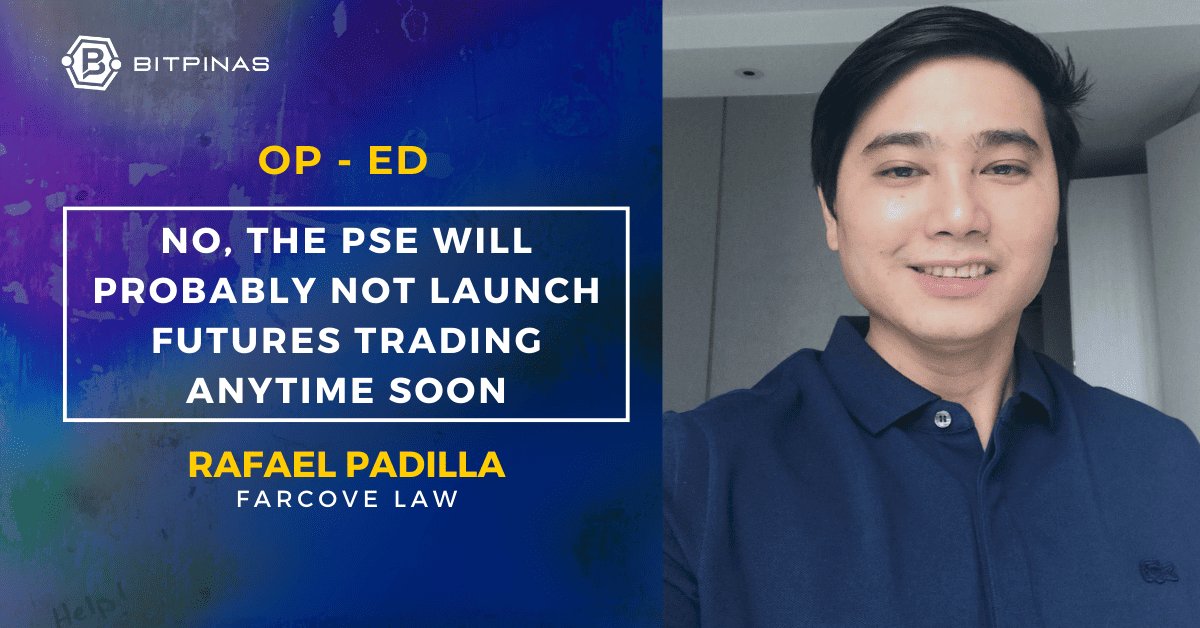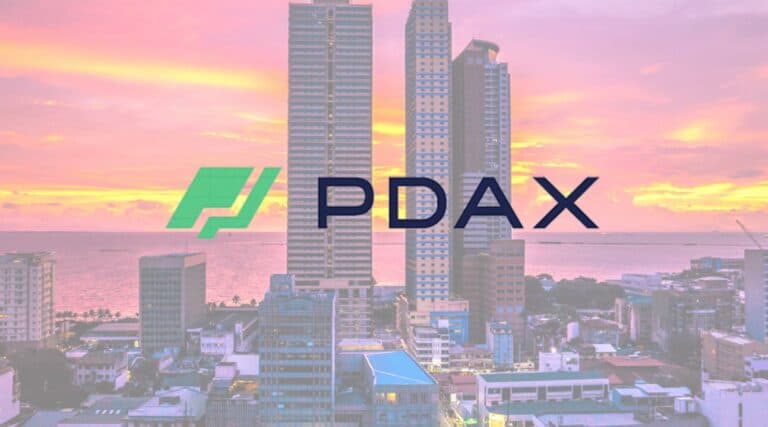NO, PSE Probably Won’t Launch Futures Trading SOON
Atty. Rafael Padilla comments on news about the PSE launching futures trading in the near future.

Atty. Rafael Padilla, 14 October 2023
The Philippine Stock Exchange (PSE) has been interested in setting up a futures exchange (for regulatory reasons, through a subsidiary or via joint venture) for more than 20 years—ever since the Securities and Exchange Commission (SEC) first proposed the issuance of rules for the reopening of a futures exchange in the Philippines, only five years after the MIFEI scandal. But PSE never actually launched futures trading partly for regulatory reasons. It is also doubtful whether the Philippines is ready to reopen futures trading 25 years after the country’s first and only futures exchange was ordered by the SEC to cease operations.
(Read more: After Short Selling, Will PSE Launch Derivatives Next?)
The MIFEI scandal
Prior to the enactment of the Securities Regulation Code[1] (SRC), in 1997 the SEC issued a cease and desist order (CDO) against the Manila International Futures Exchange Inc. (MIFEI) due to widespread manipulation, investor complaints, poor corporate governance, and other anomalies in the local futures market. Founded in 1986 and the first futures exchange in the Philippines, MIFEI was ordered to shut down for repeatedly failing to meet the conditions and reforms required by the SEC to effectively monitor, control and prevent fraudulent schemes committed by commodity futures brokers that adversely affected investors.[2]
Securities Regulation Code as legal framework for futures trading
Section 11 of the SRC, enacted in 2000, requires the issuance of implementing rules and regulations before retail investors can trade futures contracts in the commodities market:
“SECTION 11. Commodity Futures Contracts. — No person shall offer, sell or enter into commodity futures contracts except in accordance with rules, regulations and orders the Commission may prescribe in the public interest. The Commission shall promulgate rules and regulations involving commodity futures contracts to protect investors to ensure the development of a fair and transparent commodities market.”[3]
SEC’s initial plans to restart futures trading
To prevent a repeat of the massive fraud and market manipulation that led to the closure of MIFEI in 1997, the SEC released in 2002 draft rules that proposed a set of criteria for operating a futures exchange.[4] The SEC’s initial idea was to issue a license to only one futures exchange, with Pilipinas Mercantile Exchange Inc. mentioned as a potential candidate. Interestingly, the PSE also signified interest to operate a futures exchange based on the proposed rules.[5]
SEC’s suspension of futures trading
The proposed rules and regulations for the operation of commodity futures exchange was never approved by the SEC. A year later—in 2003, the Amended Implementing Rules and Regulation of the SRC (Amended SRC Rules) explicitly stated that the public trading of commodities futures contracts “shall remain suspended until further ordered otherwise” by the SEC. The 2015 SRC Rules revised the 2003 Amended SRC Rules and simply restated Section 11 of the Securities Regulation Code, providing that commodity futures contracts may be entered into only in accordance with the rules issued by the SEC. Although it was reported in 2016 that the SEC was considering proposals for the creation of an infrastructure for a futures market,[6] as of 2023, the SEC has not yet issued any memorandum circular that will allow commodities future trading by retail investors in the Philippines.
Perennial rumors about PSE launching a futures market
There’s nothing new about rumors of PSE talking to their foreign counterparts to explore how futures products (e.g. index futures) and other derivatives can be traded locally. For example, in 2008, the PSE along with the Philippine Dealing System Holdings Corp (PDS) announced plans to structure a derivatives exchange for hedging currency, stocks, credit and interest rate exposure.[7] In 2013, the PSE and the Singapore Exchange Ltd. (SGX) agreed to develop a trading infrastructure, also for Philippine index futures.[8] In 2017, the PSE announced plans to launch surveillance services for interest rate swaps, and develop exchange-traded funds, new indices, structured warrants, and other financial derivatives.”[9]
What is a futures contract?
A futures contract is a derivative considering that its price and terms are derived from an underlying asset. A new contract may be created any time two investors desire to create one.[10] For example, while there is a hard-coded limit on the amount of bitcoin that can be totally mined by 2140 (21 million), there is no limit to the number of bitcoin futures contracts that can be traded. Traditionally, an investor must deal with a registered broker to trade futures contracts. Also known as a futures commission merchant, said intermediary maintains staff and computer systems to trade on commodity futures exchanges of which it is a member.[11]
The term commodity futures contracts refers to “an agreement to buy or sell a specified quantity and grade of a commodity at a future date at a price established at the floor of the exchange.”[12] As previously discussed above, the public trading of futures contracts in the Philippines is effectively suspended until the SEC issues the pertinent rules and regulations on commodity futures trading.
Some court decisions on futures trading
In the 2006 case of SEC v. Performance Foreign Exchange Corp.,[13] the Supreme Court ruled on the legality of the cease and desist order (CDO) issued by the SEC against Performance Forex for allegedly trading foreign currency futures contracts without proper license. The allegation was explicitly denied by Performance Forex, arguing that its business was limited to spot currency trading which is not a form of currency futures transaction. The Supreme Court invalidated the CDO upon finding that it was improperly issued by the SEC. The Court observed that even the SEC was unsure of whether foreign currency exchange trading constituted futures commodity trading, and that it had to request the Bangko Sentral ng Pilipinas (BSP) for its advice. But without waiting for the BSP’s reply, the SEC denied Performance Forex’s motion to lift the CDO and made it permanent. The Supreme Court explained:
“Before a cease and desist order may be issued by the SEC, there must be a showing that the act or practice sought to be restrained will operate as a fraud on investors or is likely to cause grave, irreparable injury or prejudice to the investing public. Such requirement implies that the act to be restrained has been determined after conducting the proper investigation/verification. In this case, the nature of the act to be restrained can only be determined after the BSP shall have submitted its findings to petitioner. However, there is nothing in the questioned Orders that shows how the public is greatly prejudiced or damaged by respondent’s business operation.”
An interesting epilogue 10 years later, the Supreme Court refused to rule on the legality of foreign exchange leverage trading in the case of Cancio v. Performance Foreign Exchange Corp.,[14] reflecting the Supreme Court’s seemingly hands-off attitude with respect to high-risk financial transactions. Explaining that it would not delve further into the state of regulation because it was not the issue in the case, the Court simply remarked that “foreign exchange leverage trading is known to be risky and may lead to substantial losses for investors.” Persons who are experienced in such kind of trading “should have been more careful in the conduct of their affairs.” The Court finally remarked:
“Currency trading adds no new good or service into the market that would be of use to real persons. Instead, it has the tendency to alter the price of real goods and services to the detriment of those who manufacture, labor, and consume products. It may alter the real value of goods and services on the basis of a rumor or anything else that will cause a herd of speculative traders to move one way or the other. Put in another way, those who participate in it must be charged with knowledge that getting rich in this way is accompanied with great risk. Given its real effects on the real economy and on real people, it will be unfair for this Court to provide greater warranties to the parties in currency trading. They should bear their own risks perhaps to learn that their capital is better invested more responsibly and for the greater good of society.”[15]
Conclusion
At present, there are no commodity futures—including crypto futures such a crypto-based perpetual contracts—that are legally available in the Philippine market inasmuch as per Securities Regulation Code, “no person shall offer, sell or enter into commodity futures except in accordance with the rules, regulations and orders the (SEC) may prescribe;” however, no rules governing the trading of commodity futures are currently in effect. As explained by a former SEC official, Atty. Lucila Decasa, “until the SEC adopts the rules and regulations for the industry, no transactions in this field can be legally executed… no form of futures contract could be initiated in the private sector before the SEC has a chance to consider how to regulate it.”[16]
It seems improbable that the PSE would be able to launch and operate a commodity futures exchange by 2025. It is still controversial whether the Philippine market is ready, liquid and deep enough to sustain futures trading within acceptable level of volatility vis-à-vis futures price. It is also unclear whether the PSE have sufficient surveillance and control mechanisms in place that can deter and detect market manipulation and other fraudulent transactions occurring in the futures exchange.
In any case, before the PSE (through a subsidiary or via joint venture) can launch a futures exchange, the SEC must first issue implementing rules to operationalize the regulatory framework for commodity futures trading. As of this writing, we have not heard from the SEC any announcement on any proposed rules for futures trading, nor have we seen them engage in recent public consultation about the subject.
It is fairly easy to tell whether the rumors about PSE launching a futures exchange will ever materialize. The regulatory framework for futures exchange must first be established. Putting this framework in place will take time. In fact the SEC, for policy reasons, has not issued the pertinent rules for the past 23 years. To imagine that the PSE will soon launch a futures exchange in the absence of an SEC-approved implementing rules would be to put the proverbial cart before the horse. If indeed 2025 will be the year when the PSE will finally launch a futures market, we should be seeing by now some draft rules and regulation for commodity futures trading being circulated by the SEC for public comments.
This article is published on BitPinas: NO, PSE Probably Won’t Launch Futures Trading SOON
- R.A. No. 8799 (2000). ↑
- Lucila M. Decasa, Securities Regulation Code Annotated, p. 50 (2013). ↑
- “This is a new provision expressly authorizing the SEC to adopt and enforce rules and regulation in the field of ‘commodities futures.’ … This is, however, without prejudice to applicable rules and regulations of the Bangko Sentral ng Pilipinas.” (Decasa, Securities Regulation Code Annotated, p. 49 [2013]). Financial institutions like banks regulated by the BSP, insurance companies regulated by the Insurance Commission, or fund managers regulated by the SEC are authorized by regulation to engage in over-the-counter derivatives trading. ↑
- Zinnia dela Peña, SEC Plans to Reopen Futures Exchange, Philippine Star, October 24, 2002 (https://www.philstar.com/business/2002/10/24/181148/sec-plans-reopen-futures-exchange) ↑
- Id. ↑
- Mariano, K.R., SEC Sees Derivatives Demand Amid Rising Uncertainty, BusinessWorld, 01 November 2016. ↑
- Rosemarie Francisco, Philippines to Set up Derivatives Exchange, Reuters, 20 February 2008 (https://www.reuters.com/article/philippines-derivatives-idINMAN12697820080220) ↑
- Russell Geronimo, Law and Finance, p. 139 (2019), citing various news reports (Morales, N.J., PSEC, SGX Launch Phl-Linked Derivatives, The Philippine Star, 13 November 2013). ↑
- Id. ↑
- Marc Levinson, Guide to Financial Markets, 7th Ed., The Economist Books, p. 203-204 (2018). ↑
- Id. ↑
- See ONAPAL Philippines Commodities, Inc. v. Court of Appeals, G.R. No. 90707 (1993), where the Supreme Court noted the definition of “commodity futures contract” found in the Revised Rules and Regulations on Commodity Futures Trading issued by the SEC on 15 December 1987 and approved by the Monetary Board. ↑
- G.R. No. 154131 (2006). ↑
- G.R. No. 182307 (2016). ↑
- Id. This case should be differentiated from People v. Petralba (G.R. No. 137512 [2004]), which also involved foreign exchange trading transactions. In the Petralba case, the Supreme Court ruled that when “the investor is relatively uninformed and turns over his money to others, essentially depending upon their representations and their honesty and skill in managing it, the transaction generally is considered to be an investment contract.” In Cancio, the complainants used Performance Forex’s credit line to trade in the forex market while a broker employed by Performance acted as the complainants’ commission agent who would deal on their behalf in the forex market. ↑
- Lucila M. Decasa, Securities Regulation Code Annotated, p. 49 (2013). ↑





